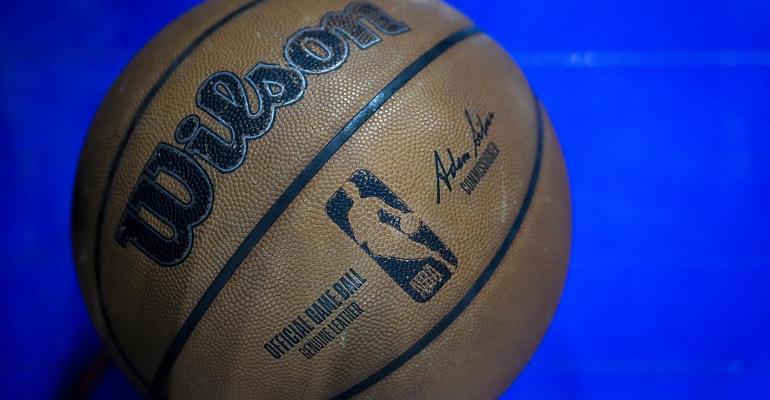A former Morgan Stanley broker defrauded several NBA stars of more than $1 million and used the money for his son’s basketball league, among other expenses, according to dual charges from the Department of Justice and the Securities and Exchange Commission.
In addition to Darryl Cohen, the DOJ also charged Brian Gilder, an independent financial planner, as well as NBA agent Charles Briscoe, and Calvin Darden Jr., for their roles in several interweaving schemes. The four defendants collectively defrauded the players of more than $13 million through a variety of schemes, of which Cohen was accused of stealing at least $1 million (Briscoe and Darden Jr. were charged in their plot to defraud players of $7 million by convincing them to fund purchasing a women's basketball team).
Though the three affected ballplayers aren’t named in the SEC complaint filed in New York’s Southern District, Jrue Holiday, Chandler Parsons and Courtney Lee were three players who filed FINRA claims against Cohen, The New York Times reported in 2022. According to The New York Times, the trio heard of Cohen through a former ballplayer and NBA assistant coach.
"As the complaint alleges, instead of protecting his clients’ investments, Cohen took advantage of their trust for his personal gain," Andrew Dean, co-chief of the SEC’s Enforcement Division’s Asset Management Unit, said about the charges.
Cohen was a broker and investment advisor with Morgan Stanley from June 2015 through April 2021; he had prior stints with Merrill Lynch and spent 12 years at Wells Fargo, according to his BrokerCheck profile.
Cohen allegedly told the athletes he was a “one-stop shop” for their financial needs, and the three failed to adequately understand the “large volumes of documentation” Cohen gave them; the advisor had full discretionary authority and access to their advisory accounts, according to the complaint.
“The defrauded clients were not finance professionals, and so they trusted Cohen and relied on his representations to them that there was safety in working with a professional, such as himself, who was associated with a large, reputable firm like (Morgan Stanley),” the complaint read.
At one point, Cohen approached two of the ballplayers to gauge their interest in investing in Beast Basketball, a nonprofit league founded by an associate of Cohen’s (both Cohen’s son and the associate’s son played on the team). The NBA stars decided against investing, but Cohen nevertheless funneled at least $500,000 from their accounts into Beast’s coffers.
The amount totaled nearly all of the $523,000 deposited into the nonprofit’s accounts during the time period in question, and nearly $200,000 of these funds went to the construction of a basketball court at Cohen’s home, according to the complaint.
Additionally, one of the NBA stars accused Cohen of improperly loaning funds out of his Morgan Stanley brokerage accounts, but after he raised the issue with Cohen, the money started reappearing. But these funds were actually being taken out of the brokerage accounts of one of the other ballplayer clients, totaling $235,000 in all; the funds were funneled through accounts owned by several of Cohen’s associates, according to the SEC.
Cohen also allegedly touted life settlement investments to the three ballplayers between November 2017 and October 2020 (the strategy involves an insured person selling their policy at a discount in exchange for cash, while agreeing that the investor will become the death benefit’s new beneficiary).
According to Cohen, the policies had minimal risk with a chance for sizable returns; in some cases, he told the clients the policies would likely pay out quickly because the insured individuals were likely to die soon.
“For example, Cohen told Client A that Client A would take over the premium payments for a policy owner who was a defendant in a much-publicized criminal matter and claimed the insured would likely either commit suicide before going to jail or die from his smoking habits,” the complaint read.
But unbeknownst to the players, Cohen and Gilder were in on a scheme to sell the insurance policies to the athletes at drastic markups of 222%, 310% and 244%, according to the DOJ. Gilder’s law firm made about $4.5 million when selling the policies to the ballplayers, while Cohen used more than $178,000 to work on his home and renovate his pool, used $67,500 for credit card bills, and $200,000 went to an unnamed romantic partner.
In 2020, Cohen’s luck ran out when one of the athletes tried to join a golf club and was asked to disclose his charitable contributions. After asking one of Cohen’s associates to give him a list, he saw the transactions to Beast Basketball and informed Morgan Stanley. Cohen was fired, and FINRA barred him from the industry after an investigation.
“We fully cooperated with the investigation and have resolved clients’ claims related to Mr. Cohen,” a Morgan Stanley spokesperson said about the charges. “Mr. Cohen was terminated from the firm in March 2021 and has since been barred from the securities industry by FINRA.”
An attorney for Cohen did not return requests for comment by publication time.
The DOJ charged Cohen with wire fraud, conspiracy to commit wire fraud and investment advisor fraud, and he faces 20 years in prison if convicted. Meanwhile, the SEC sought permanent injunctive relief, disgorgement and prejudgment interest, and civil penalties.





